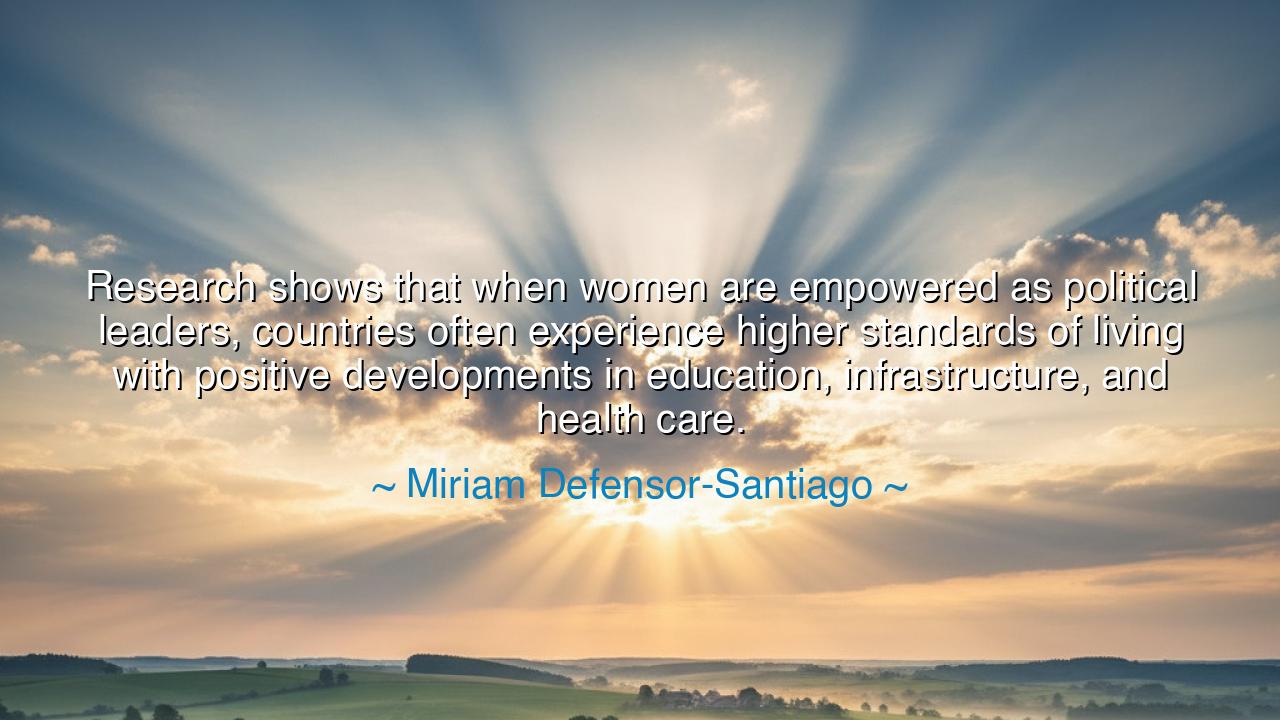
Research shows that when women are empowered as political
Research shows that when women are empowered as political leaders, countries often experience higher standards of living with positive developments in education, infrastructure, and health care.






Host: The evening had settled into a quiet calm, the room softly lit by the warm glow of the lamp. Outside, the world had transitioned into night, the gentle hum of the city fading into stillness. Jeeny sat at the table, her fingers lightly tracing the rim of her cup, her mind clearly absorbed in thought. Jack, standing near the window, gazed out at the darkening world, lost in contemplation. The atmosphere between them felt serene, but there was an unspoken weight, as if a significant conversation was just waiting to unfold.
Jeeny: (breaking the silence, her voice calm but filled with curiosity) “I came across something today by Miriam Defensor-Santiago that really made me think. She said, ‘Research shows that when women are empowered as political leaders, countries often experience higher standards of living with positive developments in education, infrastructure, and health care.’ What do you think about that?”
Jack: (pauses, his voice thoughtful) “It’s such a powerful statement. It’s not just about empowering women for the sake of equality—it’s about recognizing the tangible, real-world benefits that come when women take on leadership roles. Empowerment in leadership seems to bring about a shift, not just in policies, but in how society operates. There’s this idea that when women lead, priorities tend to shift toward areas like health care, education, and overall well-being. It’s a reminder that leadership isn’t just about power—it’s about what that power is used for.”
Jeeny: (nodding) “Exactly. The fact that countries see positive developments in key areas like education and infrastructure when women are in power speaks to a deeper truth—that women often bring a different perspective to leadership, one that is more inclusive, more empathetic to the needs of society as a whole. The focus on improving quality of life for all citizens, especially those who are marginalized, is a huge priority when women are leading.”
Host: The stillness in the room deepened as Jeeny’s words hung in the air. Jack turned slightly, his gaze softening as he reflected on what had been said. Outside, the night had settled into peaceful silence, but inside, the conversation seemed to open up a deeper understanding of how leadership and gender can intersect to bring about change in society.
Jack: (his voice more reflective) “I think it’s about shifting the focus of leadership. Often, when men are in charge, the priorities are centered around growth, power, or economic measures. But when women are in power, there’s a stronger emphasis on the well-being of the people—on ensuring that basic needs like healthcare, education, and infrastructure are addressed. Women tend to focus on the human side of leadership, and that has ripple effects that improve society as a whole.”
Jeeny: (smiling gently) “Yes, it’s about holistic leadership—thinking about the long-term impact on everyone, not just the economy or the political agenda. Women often emphasize collective well-being rather than individual or corporate interests, and that leads to more equitable and sustainable growth. Empowering women in leadership positions brings a level of empathy and social responsibility that can shape the entire direction of a country.”
Jack: (nodding slowly) “And that’s the beauty of diversity in leadership, isn’t it? When you have a range of perspectives—different genders, backgrounds, and life experiences—you get more rounded decisions. You’re not only focused on the traditional metrics of success, but on how leadership can improve the quality of life for everyone, especially the most vulnerable.”
Jeeny: (with a soft smile) “Exactly. When women lead, they often bring values of care, compassion, and inclusivity that reflect a more holistic approach to governance. It’s not just about making things work—it’s about making them work for everyone.”
Host: The quiet in the room seemed to deepen as their words settled into understanding. The world outside had gone completely still, but inside, there was a sense of clarity in the conversation. Jeeny and Jack had uncovered a deeper truth—that empowering women in leadership positions isn’t just about equality—it’s about the positive and lasting impact it can have on society. When women are in power, the focus shifts to human welfare, leading to measurable improvements in areas like healthcare, education, and infrastructure. This form of leadership, rooted in empathy and inclusivity, drives positive change in ways that uplift everyone.
Jack: (smiling softly, his voice more assured) “It’s amazing how something so fundamental—empowering women—can bring such tangible benefits. When women are empowered, everyone wins. It’s about making leadership more compassionate, more responsive to the needs of the people.”
Jeeny: (nodding warmly) “Yes. And it’s not just about fairness or equality—it’s about creating a society where everyone has the opportunity to thrive, and leadership is directed toward the greater good of all.”
Host: The night continued outside, but inside, there was a quiet understanding that empowering women in leadership positions creates a ripple effect of positive change. Jeeny and Jack had found that the benefits of such empowerment go far beyond equality—it shapes a society where well-being, education, and infrastructure are prioritized for the betterment of all. The conversation had illuminated the lasting impact of leadership that cares for the people, showing that when women lead, the world is made better for everyone.






AAdministratorAdministrator
Welcome, honored guests. Please leave a comment, we will respond soon